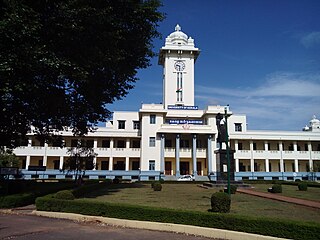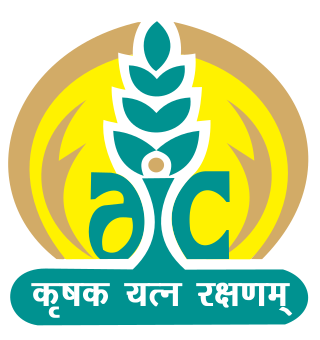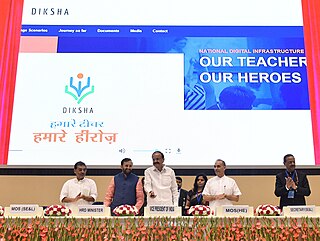
The Mid Day Meal Scheme is a school meal programme in India designed to better the nutritional status of school-age children nationwide. The scheme has been renamed as PM-POSHAN Scheme. The programme supplies free lunches on working days for children in government primary and upper primary schools, government aided Anganwadis, Madarsa and Maqtabs. Serving 120 million children in over 1.27 million schools and Education Guarantee Scheme centres, the Midday Meal Scheme is the largest of its kind in the world.

Matsyafed, the Kerala State Co-operative Federation for Fisheries Development Ltd., is the Apex Federation of 654 Primary Fisherman Co-operative Societies spread over 10 districts of Kerala, South India.

Literacy in India is a key for social-economic progress. The 2011 census, indicated a 2001–2011 literacy growth of 97.2%, which is slower than the growth seen during the previous decade. An old analytical 1990 study estimated that it would take until 2060 for India to achieve universal literacy at then-current rate of progress.

Jawaharlal Nehru National Urban Renewal Mission (JNNURM) was a massive city-modernization scheme launched by the Government of India under the Ministry of Urban Development. It envisaged a total investment of over $20 billion over seven years. It is named after Pt. Jawaharlal Nehru, the first Prime Minister of India. The aim is to encourage reforms and fast track planned development of identified cities. Focus is to be on efficiency in urban infrastructure and service delivery mechanisms, community participation, and accountability of ULBs/ Parastatal agencies towards citizens.

The importance and antiquity of education in Kerala are underscored by the state's ranking as among the most literate in the country. The educational transformation of Kerala was triggered by the efforts of the Church Mission Society missionaries, who were the pioneers that promoted mass education in Kerala, in the early decades of the 19th century. The local dynastic precursors of modern-day Kerala—primarily the Travancore Royal Family, the Nair Service Society, Sree Narayana Dharma Paripalana Yogam and Muslim Educational Society (MES)—also made significant contribution to the progress on education in Kerala. Local schools were known by the general word kalaris, some of which taught martial arts, but other village schools run by Ezhuthachans were for imparting general education. Christian missionaries and British rule brought the modern school education system to Kerala. Ezhuthu palli was the name used in earlier times. The word was derived from the schools run by the Buddhist monasteries. For centuries villages used to set up an ezhuthupally or ashan pallikoodam with one or two teachers. Students used to go this school from nearby areas and learn languages, literature, mathematics, grammar etc. After completing this students may continue study about specific subjects such as ayurveda, astrology, accounting etc. Censuses during 1800 shows that Travancore, Cochin, Kannur areas have many such schools. Even name list of ashans were used to be published along with the census.

Agriculture Insurance Company of India Limited (AIC) is an Indian public sector undertaking headquartered in New Delhi. It is a government-owned agricultural insurer under ownership of the Ministry of Finance, Government of India.
The National Horticulture Mission (NHM) is an Indian horticulture scheme promoted by the Government of India. It was launched under the 10th five-year plan in the year 2005-06. The Government of India contributes 85%, while 15% is contributed by state governments.

Agriculture in India is highly susceptible to risks like droughts and floods. It is necessary to protect the farmers from natural calamities and ensure their credit eligibility for the next season. For this purpose, the Government of India introduced many agricultural social insurances throughout the country, the most important one of them being Pradhan Mantri Fasal Bima Yojana.

The Tamil Nadu Horticulture Development Agency (TANHODA) was constituted with the objective to rto chanelise the central assistance in a larger scale to promote Horticulture
The Tamil Nadu Horticultural Producers Co-operative Enterprises Limited (TANHOPE) was constituted with the objective to rto chanelise the central assistance in a larger scale to promote Horticulture.
Dinesh Arora is an officer of the Indian Administrative Service, 2002 Kerala cadre, presently pursuing his doctoral studies in public health at Johns Hopkins University. He is former Deputy Chief Executive Officer of the Prime Minister Narendra Modi’s flagship healthcare programme, Ayushman Bharat Yojana, in the Ministry of Health and Family Welfare. Prior to this, he was the Director at NITI Aayog. He was the Founder Mission Director of National Rural Health Mission, Kerala, Founder Managing Director of Kerala Medical Service Corporation Limited (KMSCL), and the first Food Safety Commissioner in the State of Kerala. Arira was also worked as an executive director, Rural Electrification Corporation (REC) and CEO RECPDCL, Ministry of Power, Government of India. Arora is proficient in English, Hindi, Malayalam, Punjabi, and Tamil.
Rashtriya Madhyamik Shiksha Abhiyan (RMSA) is a centrally sponsored scheme of the Ministry of Human Resource Development, Government of India, for the development of secondary education in public schools throughout India. It was launched in March 2009. The implementation of the scheme has started from 2009–2010 to provide conditions for an efficient growth, development and equity for all. The scheme includes a multidimensional research, technical consulting, various implementations and funding support. The principal objectives are to enhance quality of secondary education and increase the total enrollment rate from 52% to 75% in five years, i.e. from 2009 to 2014. It aims to provide universal education for all children between 15 and 16 years of age. The funding from the central ministry is provided through state governments, which establish separate implementing agencies. The total budget allocated during the XI Five Year Plan (2002-2007) was ₹2,012 billion (US$25 billion).
Pradhan Mantri Krishi Sinchai Yojana is a national mission to improve farm productivity and ensure better utilization of the resources in the country. The budget of ₹53 billion (US$660 million) in a time span of one year 2015-2016 has been allocated to this scheme. The decision was taken on 1 July 2015 at the meeting of Cabinet Committee on Economic Affairs, approved with an outlay of 50000 crore for period of 5 years.

The Pradhan Mantri fasal bima yojana (PMFBY) launched on 18 February 2016 by Prime Minister Narendra Modi is an insurance service for farmers for their yields. It was formulated in line with One Nation–One Scheme theme by replacing earlier two schemes Agricultural insurance in India#National Agriculture Insurance Scheme and Modified National Agricultural Insurance Scheme by incorporating their best features and removing their inherent drawbacks (shortcomings). It aims to reduce the premium burden on farmers and ensure early settlement of crop assurance claim for the full insured sum.

First Pinarayi Vijayan ministry is the Council of Ministers headed by Pinarayi Vijayan that was formed after the Left Democratic Front (LDF) won the 2016 Kerala Legislative Assembly elections. The Council assumed office on 25 May 2016. The ministry had a total of 19 ministers in the Cabinet at the time of swearing-in compared to 21 ministers in the previous government. Pinarayi Vijayan sworn in as 22nd Chief Minister of Kerala, 12th person to hold this position. Chief Minister Pinarayi Vijayan on 3 May 2021 submitted the resignation of the Council of Ministers headed by him to Governor Arif Mohammed Khan after winning a historic victory in the 15th legislative assembly elections by winning 99 of the 140 seats in the Assembly.

Nava Kerala Mission is an initiative of the Pinarayi Vijayan-led Government of Kerala launched in November 2016. The initiative seeks to address problems faced in four key social sectors, namely, health, education, agriculture and housing, with the help and involvement of local self-governments. The Mission was officially launched by P. Sathasivam, Governor of Kerala, in a meeting held in Thiruvananthapuram on 10 November 2016.

The National Education Mission is an overarching programme for the school education sector extending from pre-school to class 12, launched in 2018. It was allocated a budget of ₹385.72 billion (US$4.8 billion) in the 2019 Interim Union Budget of India. The stated mission comprises four schemes, namely Saakshar Bharat, Sarva Shiksha Abhiyan, Rashtriya Madhyamik Shiksha Abhiyan and the Centrally Sponsored Scheme on Teacher Education (CSSTE). In 2021, the NIPUN Bharat Mission was launched as part of Samagra Shiksha Abhiyan, teaching literacy and numeracy skills in universities by Grade 3.
The Department of Agriculture and Farmers' Welfare (DA&FW) is one of the three constituent department of Ministry of Agriculture and Farmers' Welfare, the other two being Department of Agriculture Research and Education (DARE) and Department of Animal Husbandry and Dairying. The Department is headed by Minister of Agriculture and Farmers' Welfare.
Unemployment in Kerala discusses the causes and measures of Kerala unemployment and strategies for reducing it. Job creation and unemployment are affected by factors such as economic conditions, global competition, education, automation, and demographics. These factors can affect the number of workers, the duration of unemployment, and wage levels.












